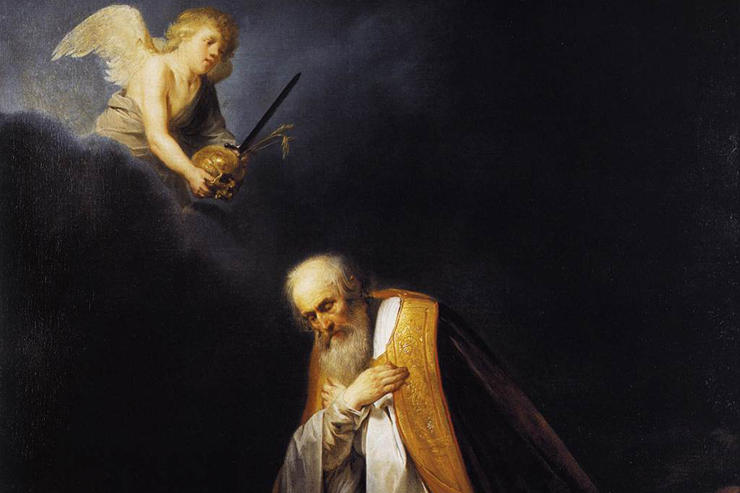Would I forgive King David?
by Joannie Watson | January 31, 2020 12:04 am
 [1]
[1]“Would I be as merciful as God was towards David?“
Even if you can’t get to daily Mass, I highly recommend using the readings of the day in your daily prayers. It is a way to unite your prayers with Catholics throughout the world, to live liturgically, and to become familiar with the great stories and wisdom of Sacred Scripture.
Today’s first reading[3] is the familiar story of the fall of David with Bathsheba. We know the story well; lust fills David upon seeing Bathsheba bathing on her roof. They commit adultery, and she conceives their child. After his attempts to hide his sin fail, he resorts to arranging for Uriah’s death in battle. The great king, the Lord’s anointed, the just ruler, has fallen mightily. David is an adulterer and a murderer.
This pivotal moment in David’s life has inspired countless writings, conjectures, and reflections. Why was he lingering at home instead of being out on the battlefield? What role did Bathsheba play? How would history have turned out differently if Uriah would have “cooperated” with David’s scheming and gone home to his wife?
I can’t help but wonder what I would think of David today. The prophet Nathan comes to him with a parable[4] of a rich man stealing a poor man’s lamb, which angers David. Nathan’s dramatic revelation, You are the man!, prompts David to great contrition and repentance. David perhaps never tires of reflecting on the Lord’s mercy, the fruit of that reflection we can see in Psalm 51.
Would I be as merciful as God was towards David?
The late Cardinal George once pointed out, “In the United States, everything is permitted, even encouraged: ‘Go for it, try it, do it,’ we are urged, no matter what the ‘it’ might be. But, while everything might be permitted, practically nothing is forgiven.”
What would our society’s response be to David? Even after he showed true repentance, even after he paid the consequences of his sin, would we allow him to move on? Would we forgive and continue walking with him? Or would we cut him off?
God’s mercy doesn’t make what David did okay. Nor does it mean that David doesn’t have to pay the consequences for his sins. But after David’s repentance, he becomes an icon of the radical nature of God’s mercy. “I have chosen David, my servant; with my holy oil I have anointed him. . . . My faithfulness and mercy will be with him” (Psalm 89:21,25). God repeats again and again throughout the Scriptures – His mercy is powerful. He wants to extend it. Knowing we will fall, he still forgives.
Henri Nouwen famously wrote about the importance of the “wounded healer.” While he didn’t coin the phrase or invent the concept, it is an important one for ministry. We can’t escape our wounds, Nouwen points out, but we can put those wounds in service of others. I can’t help but wonder if we don’t cut off those wounded healers in our lives, in society, and in the Church because we don’t forgive them. We don’t allow people to learn from their sins and come back to help us heal.
It is distressing and upsetting to experience a leader fall from grace. It is difficult to have a hero fail us. These things can challenge our faith and trust. But if that leader repents and attempts to change, what do we do next?
When I sin, I run to confession and hope in the Lord’s mercy. I trust that God will forgive me. But what do I do when others sin? Do I hold myself to the same grand standard that I hold everyone else? When someone sins – even gravely – I must remember that they are a work in progress… just like I am. The more public the person, the more public their fall will be, of course. Yet even then – their story is still being written.
If David’s life was being played out today, how would I respond? Above all, I pray that I would have the mind of the Lord, Who is willing to welcome him back and Who doesn’t allow him to be defined by his sin.
Cardinal George’s quote continues, “…while everything might be permitted, practically nothing is forgiven. By contrast, in the Church much is not permitted: ‘If you love me, keep my commandments,’ Jesus says (Jn. 15:10). But, while much is not permitted, everything can be forgiven. Our culture pulls us towards vengeance; our faith towards mercy.”
Mercy, which reminds us that no one is free from the struggle against concupiscence. Divine mercy, which ensures even the greatest sinner has a possible future. Mercy, which reminds me that I too am a sinner, but can pray with David:
“Turn away your face from my sins;
blot out all my iniquities.
A clean heart create for me, God;
renew within me a steadfast spirit.
Do not drive me from before your face,
nor take from me your holy spirit.
Restore to me the gladness of your salvation;
uphold me with a willing spirit.
I will teach the wicked your ways,
that sinners may return to you.” (Psalm 51:11-15)
Please share this article on Facebook and other social media below.
- [Image]: http://www.integratedcatholiclife.org/wp-content/uploads/king-david-in-prayer-pieter-de-grebber-detail-w740x493.jpg
- via Wikimedia Commons: https://commons.wikimedia.org/wiki/File:5201-king-david-in-prayer-pieter-de-grebber.jpg
- first reading: http://usccb.org/bible/readings/013120.cfm
- with a parable: http://www.usccb.org/bible/2samuel/12
Source URL: https://integratedcatholiclife.org/2020/01/watson-would-i-forgive-king-david/